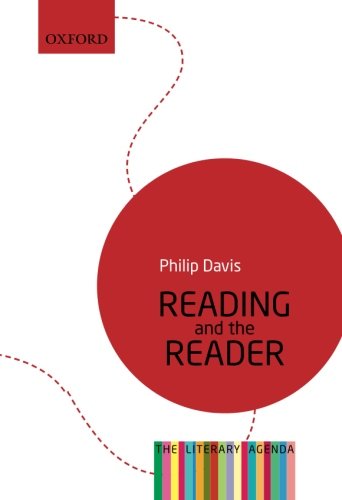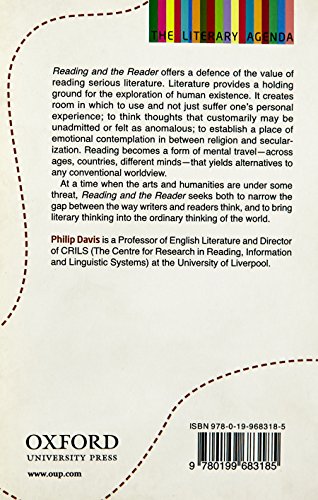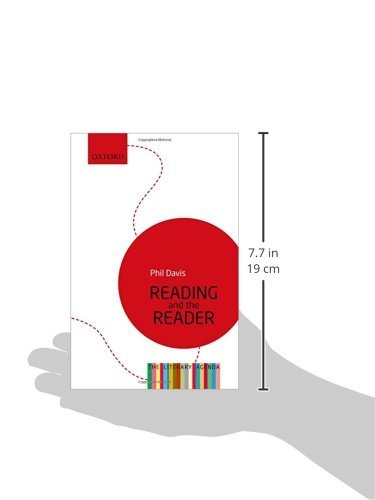Customer Services
Copyright © 2025 Desertcart Holdings Limited




Full description not available
D**G
Reading fights back
Resist the dumbing-down of the "free" marketeers with this erudite analysis of why reading matters. Stay critical, stay literate, stay on top of the BS.
J**E
Inspirational
This book is the first of a series entitled The Literary Agenda. Its central thesis provides an argument for the importance of reading serious literature and its effects on the emotional intelligence of the reader. In short, to read and appreciate serious literature has major and positive benefits for the one who reads. By literature, the author means poetry, drama and fiction.Not the least of the pleasures of reading this book is to enjoy the examples the author gives from, inter alia, Hardy, Shakespeare, Conrad, C Day Lewis, and his sensitive use of these authors' works to illustrate and explain his central points. The reading of literature, he argues, provides for the reader a `holding-ground' which is the establishment of a mental place for intellectual and emotional contemplation. Thus the reader can think about and experience alternative world views, ideas and emotions in a `place apart' from the reality of his own world.It is no exaggeration that I have found this little book inspirational. While it is essential to read it from cover to cover to appreciate its full argument and message, I am convinced that I will read sentences, paragraphs, pages and sections over and over again for years to come to appreciate the subtlety of what the writer has to say. It is not by any means a quick nor an easy read, despite its brevity, but it is a pleasurable one, to be taken slowly and to be revisited.
S**R
Literature has so much to offer us
This book is not a quick read but one to ponder over. In a time when there is much less support for the arts and humanities (for example, in 2009 the government cut funding for the arts in favour of the sciences), this book provides a staunch defence of the importance of literature and reading. It is part of an Oxford University Press series, "The Literary Agenda", which is "a series of short polemical monographs about the importance of literature and of reading in the wider world and about the state of literary education inside schools and universities" (quote source: [...]). I think that reading is vitally important for personal development and literature has much to offer us in terms of different perspectives and views.This is an excellent book and I will certainly be reading further publications in this series.
J**D
Why the Arts are important, especially reading
This is a learned book, and not a quick afternoon read, so I haven't finished it yet.Its one to read slowly and then to think about.However it has a serious message, that the arts or humanity subjects are important and their value is in danger of being lost as we try to put a price on education. When students have to pay (and in the US increasingly huge amounts) for their education. They will ask questions like "What value to me is English Literature?". They may enjoy reading, but struggle to justify studying it from future earnings potential.This book argues that it is by reading and studying literature that we become truly human. In reading we are confronted by our own humanity and values, and have to consider them deeply.It is well argued, and has convinced this scientist so far.
M**D
short and dense and powerful...if you are a reader, you must read this!
A compelling little piece, making the case for the power of literature to transform. In a world where libraries are being closed down because they are not seen as useful or essential, the fact that this book exists at all is heartening.Not an easy read, but then who said reading had to be easy? This is worth while. You need to read this book...
S**O
Erudite and deeply fascinating.
I'm not easy to please with texts like this but this one is written by a leading English professor and it's soon clear that he is utterly fascinated and absorbed by his subject - literature - and the way we respond to it. The controlling idea behind the book is that there exists some kind of primordial "gap" between the reading of literature and our interpretation of it, a space in which the mind searched to "connect" with the words on the page but which, in doing so, creates a space where much of value to life can be explored and even in a sense "experienced". This all sounds very mystical, but it isn't. In one sense there's nothing "new" here - as what the writer does is to show us what we "know" already, but haven't fully realised: how literature "works" and why it is so valuable.I can't speak too highly of the book, and I teach this subject every day for a living. It has various texts within it to help show how what is proposed "works", and these work very well indeed. The Shakespeare sonnet is superb, frankly. This is an erudite and none-too-easy read, but, my, it is fascinating and satisfying. Highly, very highly, recommended.
M**H
An unreadable book about reading.
Davis' approach: quote a difficult and uninteresting piece of literature, then make some obvious or indecipherable point about it at great and extremely tedious length. For instance he quotes a long and tedious poem by Hardy about a chap finding himself jilted. He suggest there is something really special about the last line of the first stanza 'You did not come' being separated by a space from the first line of second stanza 'You love me not'. It supposedly creates a 'holding ground' for the reader to have some great thoughts on the subject. I wasn't having them, apart from perhaps, 'I'd be better of reading Tolstoy or George Eliot about these matters than Hardy or Davis, great authors should give me some great thoughts rather than expect me to have them...'And so it goes throughout the book. Davis makes a point, I don't get it, or it seems banal, or it seems absurd, or it seems very laboured. Davis suggest there is a crisis in the humanities. Yes there is, and its exemplified by this book. For me the crisis pans out in finding it difficult to find something interesting to read because there are so many critics & professors, like Davis, leading me down the garden path into a desert.
Trustpilot
5 days ago
1 month ago